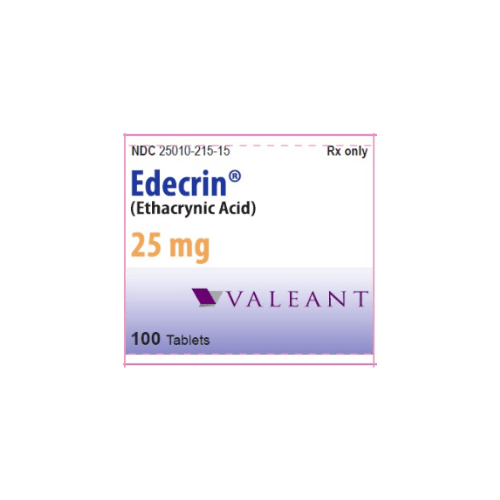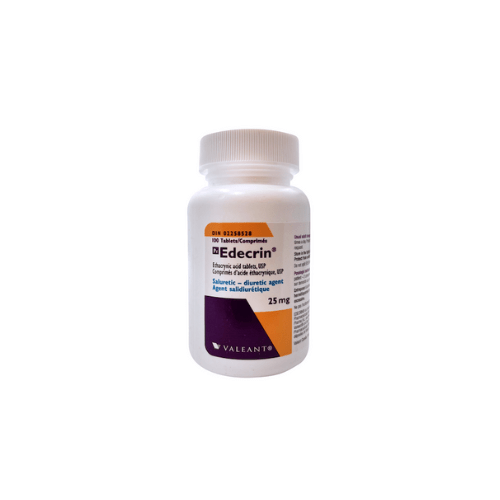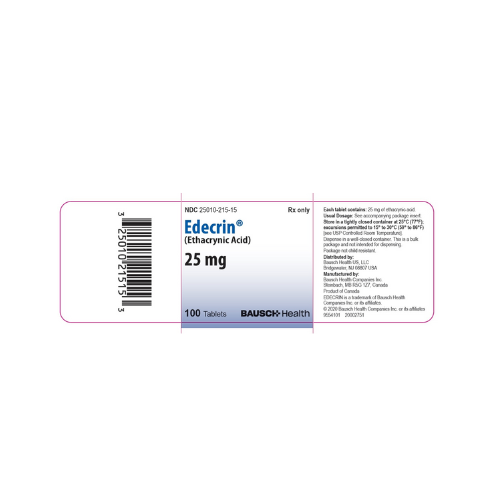Please note: a valid prescription is required for all prescription medication.
What Edecrin® Is and How It Works
Edecrin® (ethacrynic acid) is a loop diuretic used to reduce edema caused by heart failure, kidney disease, or liver cirrhosis. CanadianInsulin is a prescription referral service. Prescriptions are verified with your clinic, and orders are filled by licensed Canadian pharmacies. We work with licensed and vetted partner pharmacies to provide authentic brand medications, a broad selection, and value‑focused pricing. Shoppers comparing Edecrin price or edecrin price without insurance often choose CanadianInsulin for dependable access and support.
Ethacrynic acid blocks the sodium‑potassium‑chloride (Na‑K‑2Cl) transporter in the thick ascending limb of the loop of Henle. This increases sodium, chloride, and water excretion, which reduces swelling and fluid overload. Edecrin is not a sulfonamide, so it is an option for patients who cannot take sulfonamide‑based loop diuretics. It is available as oral tablets. Dosing is individualized by the prescriber based on edema severity, kidney function, and response. Many patients take it once daily in the morning; some need a second dose earlier in the afternoon.
Uses include edema from congestive heart failure, nephrotic syndrome, and hepatic cirrhosis. It may be used when other diuretics are not tolerated or when a stronger diuretic response is needed. Blood pressure reductions can occur, but the primary goal is fluid removal. Your care team will monitor response and electrolytes to guide dosing.
Dosage and Usage
- Take tablets exactly as prescribed. Many regimens start with a low dose and adjust in small steps to reach the desired diuretic effect.
- Swallow tablets with water. Dosing with food can help stomach upset.
- Morning dosing is common to limit nighttime urination. If a second dose is used, take it in the early afternoon.
- If a dose is missed, take it when remembered unless it is close to the next dose. Do not double doses.
- Your prescriber may adjust the dose based on weight change, edema, or lab results (especially potassium, sodium, and kidney function).
- Report hearing changes, severe dizziness, or muscle cramps promptly to your care team.
- Storage: Keep tablets at 20–25°C (68–77°F). Protect from moisture and store in the original container.
- Short excursions: 15–30°C (59–86°F) are acceptable. Avoid heat, direct sunlight, and freezing.
- Travel: Carry your medication in hand luggage. Keep it in the labeled bottle. Bring enough for the entire trip plus extra days.
- Do not store in a bathroom or car glove box. Use a pill organizer only if it stays dry and protected.
- If tablets get wet, discolored, or damaged, contact a pharmacist before use.
Benefits and Savings
Edecrin helps relieve swelling in the legs, abdomen, and lungs. Reducing excess fluid can improve comfort, breathing, and mobility. As a non‑sulfonamide loop diuretic, it may be suitable for patients who cannot take other loop diuretics. Flexible tablet dosing allows careful titration to reach the right balance of decongestion and safety.
Many customers save 60–80% vs typical U.S. prices. This can be helpful if comparing the Edecrin price without insurance. See our promotions page for current offers, including any edecrin coupon if available.
Side Effects and Safety
- Frequent urination, thirst, or dry mouth
- Dizziness or lightheadedness, especially when standing
- Headache or fatigue
- Stomach upset, nausea, or diarrhea
- Electrolyte changes: low potassium, sodium, or magnesium
- Muscle cramps or weakness
- Increased uric acid or gout flare
- Rash or photosensitivity
- Hearing changes (ringing, muffled hearing)
Serious effects are less common but require urgent evaluation: severe dehydration or low blood pressure; profound electrolyte loss; hearing loss or tinnitus (risk increases with high doses, IV use, or aminoglycosides); kidney function changes; confusion; allergic reactions. Drug interactions can occur with lithium, digoxin, aminoglycosides, cisplatin, NSAIDs, and other blood pressure agents. Edecrin is not appropriate in anuria. Patients with cirrhosis, renal impairment, existing hearing problems, or frailty need careful monitoring and tailored dosing.
Onset Time
After an oral dose, diuresis often begins within 30–60 minutes. Peak effect occurs around 2 hours, with activity lasting about 6–8 hours. Visible edema reduction can develop over several days as fluid is mobilized and dosing is fine‑tuned. Weight may decrease in the first week as excess fluid is removed. Longer‑term symptom relief depends on the cause of edema and adherence to the treatment plan.
Compare With Alternatives
Other loop diuretics include furosemide, bumetanide, and torsemide. All act on the same nephron transporter, but potency, bioavailability, and duration vary. Ethacrynic acid is unique in that it is not a sulfonamide, which can be a consideration for patients with sulfonamide reactions.
In some situations, a potassium‑sparing approach or a thiazide combination is used. For example, adding spironolactone can help counter potassium loss and improve ascites management in cirrhosis. You can review options such as Spironolactone Hctz and Spironolactone if your prescriber recommends a different strategy or combination.
Patients whose edema does not respond to one loop diuretic may respond to another or to a carefully supervised combination with a thiazide‑type diuretic. The choice depends on kidney function, electrolyte balance, and the underlying condition.
Combination Therapy
- Loop plus potassium‑sparing diuretic (e.g., spironolactone) to reduce potassium loss and support ascites control.
- Loop plus thiazide/thiazide‑like diuretic for short courses when diuretic resistance occurs; close lab monitoring is essential.
- Loop with ACE inhibitor or ARB for heart failure or hypertension; monitor blood pressure, kidney function, and potassium.
- Loop with SGLT2 inhibitor or beta‑blocker in heart failure when part of a broader regimen.
- Background antihypertensive doses may need adjustment to reduce hypotension risk as fluid status changes.
Patient Suitability and Cost‑Saving Tips
Edecrin may be considered for adults with edema due to heart failure, renal disease, or liver disease. It is often chosen when a strong diuretic effect is needed or when sulfonamide‑based loop diuretics are not suitable. Patients with severe electrolyte depletion, anuria, uncontrolled gout, profound hearing impairment, or severe dehydration require caution or alternative therapy.
Pregnancy and breastfeeding considerations should be reviewed with a clinician. Older adults may be more sensitive to volume changes and electrolyte shifts. Regular lab monitoring and dose adjustments help maintain safety.
To reduce costs, consider a multi‑month supply if appropriate for your prescription. Combine items in one shipment when possible. Set a reminder to reorder before running out, allowing time for prescription verification. CanadianInsulin offers value‑focused pricing on authentic brands and generics, with prompt, express, cold‑chain shipping.
Authoritative Sources
Drugs@FDA: Edecrin (ethacrynic acid) application overview
Health Canada Drug Product Database: ethacrynic acid listings
DailyMed: FDA‑approved ethacrynic acid labeling
Order Edecrin® from CanadianInsulin: add to cart, upload your prescription, and we ship with prompt, express, cold‑chain handling.
This page is educational and does not replace guidance from your healthcare professional. Always follow your prescriber’s directions and consult them about medical questions, side effects, or changes to your therapy.
Express Shipping - from $25.00
Shipping with this method takes 3-5 days
Prices:
- Dry-Packed Products $25.00
- Cold-Packed Products $35.00
Standard Shipping - $15.00
Shipping with this method takes 5-10 days
Prices:
- Dry-Packed Products $15.00
- Not available for Cold-Packed products
What is Edecrin used for?
Edecrin (ethacrynic acid) is a loop diuretic used to reduce edema associated with congestive heart failure, kidney disease, and liver cirrhosis. It increases urine output by blocking sodium and chloride reabsorption in the loop of Henle. It is sometimes chosen when sulfonamide‑based loop diuretics are not suitable.
How does Edecrin differ from other loop diuretics?
Ethacrynic acid is not a sulfonamide, which can be important for patients with sulfonamide reactions. Potency and duration differ from furosemide, bumetanide, or torsemide. The risk of hearing effects may be higher at large doses or when combined with ototoxic drugs. The choice depends on response, safety, and comorbidities.
How fast does Edecrin start working?
Oral Edecrin usually begins increasing urine output within 30–60 minutes. Peak effect occurs around 2 hours, and the diuretic action lasts about 6–8 hours. Edema reduction may take several days as dosing is adjusted and fluid is mobilized. Timelines vary with kidney function and the underlying condition.
What are common side effects of Edecrin?
Common effects include frequent urination, thirst, dizziness, headache, stomach upset, and electrolyte changes such as low potassium or sodium. Muscle cramps, fatigue, or gout flare can occur. Less commonly, hearing changes, severe dehydration, or kidney function changes occur. Report concerning symptoms to a clinician promptly.
How is Edecrin usually taken?
Dosing is individualized. Many patients take a morning tablet, with an added early afternoon dose if needed. Tablets can be taken with food to reduce stomach upset. Missed dose: take it when remembered unless it is close to the next dose. Never double doses. Monitoring guides dose adjustments.
Can I save on the Edecrin price through CanadianInsulin?
CanadianInsulin helps customers compare Edecrin price options on brand medications from licensed pharmacies. Many customers save 60–80% versus typical U.S. prices. Multi‑month fills and combining items in one shipment may further reduce overall costs. Prescription verification is required for all orders.
Are there important drug interactions with Edecrin?
Interactions can occur with lithium, digoxin, aminoglycosides, cisplatin, and NSAIDs. Blood pressure medicines may amplify hypotension. Combining with other diuretics can increase electrolyte loss and requires close monitoring. Share a complete medication list with your prescriber so dosing and lab checks can be adjusted as needed.
Rewards Program
Earn points on birthdays, product orders, reviews, friend referrals, and more! Enjoy your medication at unparalleled discounts while reaping rewards for every step you take with us.
You can read more about rewards here.
POINT VALUE
How to earn points
- 1Create an account and start earning.
- 2Earn points every time you shop or perform certain actions.
- 3Redeem points for exclusive discounts.
You Might Also Like
Related Articles
What Are BD Needles? Uses, Types, and Benefits Explained
BD needles are among the most trusted names in medical care, recognized globally for their precision, safety, and comfort. Manufactured by Becton, Dickinson and Company, a global leader in medical…
Droncit for Cats and Dogs | Effective Tapeworm Treatment
If your pet is scratching more than usual or showing signs of weight loss despite eating well, it could be more than just a minor issue; it might be tapeworms.…
Premixed Insulin: How It Works and What to Know
Managing blood sugar effectively remains the cornerstone of preventing long-term complications, and insulin therapy plays a vital role in this effort. While many patients are familiar with basal and bolus…
6 Week Plan Ozempic Weight Loss Results: Track Progress
Starting a new weight loss journey can be exciting, especially when you’re using a medication that has shown real success in helping people achieve lasting results. Ozempic, a prescription medicine…





